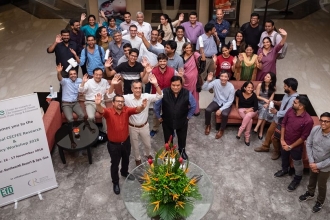
4th Annual CECFEE Research and Policy Workshop
The Center for research on the Economics of Climate, Food, Energy and Environment (CECFEE) of the Indian Statistical Institute, New Delhi, will conduct the 4th Annual CECFEE Research and Policy…

The Center for research on the Economics of Climate, Food, Energy and Environment (CECFEE) of the Indian Statistical Institute, New Delhi, will conduct the 4th Annual CECFEE Research and Policy…

A workshop was organized by the Centre along with the Environment for Development Initiative (EFD) of the University of Gothenburg on October 15th and 16th at Ranthambhore. There were presentations…

AGENDA Monday, November 2, 2015 Morning Introduction and Welcome – E. Somanathan About EfD – Gunnar Kohlin, University of Gothenburg Credit, LPG Stove Adoption and Charcoal Consumption: Evidence from…
Biomass burning of agricultural field residue (stalks and stubble) during wheat and rice harvesting periods in the Indo-Gangetic plains has led to substantial emission of trace gases and particles. This paper seeks to address the regulation of emissions from open field burning of rice residue in Punjab, India by first uncovering the factors that explain on field residue burning of rice residue in Punjab. The results suggest that the use of a combine harvester was the single most important determinant of the decision to burn rice residue.
It is well-recognized that new technology is a crucial part of any solution to the problem of climate change. But since investments in research and development take time to mature, price and quantity instruments, i.e., carbon taxes and cap-and-trade, run into a commitment problem. We assume that the government cannot commit to the level of a policy instrument in advance, but sets the level to be optimal ex-post.
This paper provides a comparative assessment of the productive efficiency of three common coffee growing systems in Vietnam: mono-cropping, synchronization and segregation. Results from an input distance function approach deliver several important findings. First, the average inefficiency level is estimated to be around 18% although inefficiency varies significantly between the three farming systems.
The mangrove area in Viet Nam is dramatically decreasing in the last decades. Since 1995, mangrove forests in south Viet Nam are allotted and contracted to households for protection, management and logging. Under this policy, households are allowed to convert 20–40% of the allotted forests into other uses, mainly shrimp farming. Most households develop mixed shrimp-mangrove farming systems, in which shrimp ponds are mixed with mangrove forest.
Although beer is widely consumed around the world and has the largest market share among alcoholic beverages, there is a paucity of studies on consumers’ preferences for beer compared to wine. In this study, consumers were asked to select the best and worst favorable beer from choice sets of a labeled choice experiment, in which choice options were labeled by brand names.
An investigation about the adaptive capacity of residents in Ho Chi Minh City when facing the flooding problems which have frequently happened in recent years. Although the government has spent a lot of money in the drainage system, and the situation has been reported to be better, a high proportion of surveyed people said that the improvement is just local; however, the whole city still needs more effort to control flooding. Households living closely to frequently flood-prone usually consider two main measures to protect themselves from the flood: Floor elevation or dry-proof investment.
We propose a structural approach to investigate total factor productivity (TFP) and economic growth of 58 provinces and municipalities of Vietnam (known as one of the most dynamic emerging economies in the last few years). The analysis is applied to the provincial data that are available to us for the period 2000–2007. TFP is composed of three components: an autonomous technological change, an observed deterministic part depending on external factors, and an unobserved stochastic part.